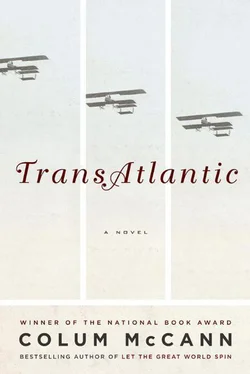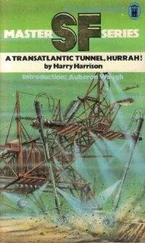It has been, on occasion, like playing hide-and-seek with oneself. Open the door and there you are. Count to twenty yet again. Ready or not. Run and hide. Pretend you don’t know where you are.
He used to play that game with his brothers when he was young, in the small house in Waterville. He hid in the closet beneath the stairs where his mother kept the jars of figs. A familiar smell. The jars were ranged high on the shelves: his own small Lebanon, cramped and tidy. A tiny glint of light came from the hallway, leaked in, clarified the dark. He tucked himself away in the corner, at the base of the wooden shelves, waiting to be caught. His brothers got so used to him hiding in the same place that once they left him for hours, just to rile him, and to rile them back he just stayed completely still, remained beneath the stairs until after dinner when they finally came to get him out, cramped, sore, vaguely victorious.
The old days, they arrive back in the oddest ways, suddenly taut, breaking the surface, a salmon leap. The Waterville house backed onto the wide Kennebec River. The smoke from the mill drifted downstream. Huge logs arrived and were winched, dripping wet, from the gray river. The wood saws whined. Sawdust whipped across the wind. Railway whistles pierced the air. The town had a vigilance about it. He worked the newspaper route. Rode a bicycle with fringed handlebars. Hopped across the railway trestles. Learned the back roads and the byways. The coins in his pockets clanged. He liked the days when the river iced and he wondered about what it carried underneath: water beneath water. He watched the men coming home from the factories after long days of giving up their flesh. Mornings of fresh blue snowfalls. By the end of the day the snow was dark with grit.
He grew up in his brother’s clothes. It used to make his mother smile to see the shirts slide from one shoulder to another, as if youth were just a thing that would always be passed along the line. When he was finished with the clothes, she would load them up and drive them to the Salvation Army store down on Gilman. Ya hadi she would say. Give us grace.
He was aware of the Horatio Alger quality that hung around him. His mother was Lebanese, a textile worker. His father, an orphan, a janitor in a college. An American boyhood. The newspapers sometimes mocked it. He walked out of college into an unquiet life. Torts, contracts, deeds, the gavel. He could quite easily have been a lawyer in a bow tie, or a small-town judge living on the outskirts of town. He thrived on Webster and Darrow. A Plea for Harmony and Peace. Resist Not Evil . Mysteries dissolving into facts. As a lawyer, he hated to lose. No virtue in second place. He took his chances. Attorney, candidate for governor, federal judge. Fifteen years in Washington. Majority leader for six years. The second most powerful man in America.
He knew how to flip a coin in the air and listen to the language of how it was made to land: what amazed him was that there were times when a coin could land sideways. Vietnam. Grenada. El Salvador. Kuwait. Bosnia. Mexico. All those times when logic was perched on a rim. Health care. NAFTA. The Clean Air Act. The occasional dividend of change.
He retired then, ready to pursue his own route, practice law, breathe easy, leave the flashbulbs behind. Even turned down the Supreme Court. But then the President phoned again. Clinton’s casual charm. The ambitious ease. A favor, George, he said. Two weeks in Northern Ireland. It’s just a trade convention. That’s all. An escape across the water. The Senator was drawn in. He would go for a fortnight, that was all. Before he knew it, it was a year, then two, then three. The shadows of Harland and Wolff falling over Belfast. Where the Titanic had once been built. The vague hope of helping to turn the long blue iceberg, the deep underwater of Irish history.
He glances out the window now at the rows of planes, the moving carts, the men on the runway waving their neon sticks. All the world, always going somewhere. Everyone in a rush. The fatal laws of our own importance. How many aloft at this very moment? Looking down on ourselves in the hazy and confused landscape below. How odd to glimpse the reflection of himself in the window, as if he is both inside and outside at the same time. The young boy looking in at the man in his late years, a father again, surprised to be here at all. The manner in which life deals the unexpected. So constantly unfinished.
He has been asked many times by reporters if he can explain Northern Ireland. As if he could whisk a phrase out of the air, a sound bite for the ages. He is fond of Heaney. Two buckets were easier carried than one. Whatever you say, say nothing . Brief breakthroughs. Intermittent calm. Large ruptures in the landscape. He has never even been able to get all the political parties together in the same room, let alone the whole situation in a single phrase. It is one of their beauties, the Irish, the way they crush and expand the language all at once. How they mangle it and revere it. How they color even their silences. He has sat in a room for hours on end listening to men talk about words and yet never mention the one word they want. The maniacal meanderings. The swerves and sways. And then, all of a sudden, he has heard them say, No, no, no , as if the language only ever had one word that made any sense at all.
Paisley. Adams. Trimble. McGuinness. Throw a word in their midst and watch them light the fuse. Ahern. Blair. Clinton. Mowlam. Hume. Robinson. Ervine. Major. Kennedy. McMichael. A fine cast. Shakespearean almost. And he sits in the wings, with de Chastelain and Holkeri, waiting for the moment for the cast to bring out their spears. Or not.
There has been, he must admit, a thrill to his days in the North. An edge. A recklessness he enjoys. Another boyhood. Under the stairs. Ready to emerge, in suit and tie, with hands raised high in false surrender. Strand One, Strand Two, Strand Three. He dislikes the praise, the glad-handing, the false backslaps, the gestures to his patience, his control. It’s the tenacity of the fanatic that he wants to pitch himself against. There is, he knows, something akin to his own form of violence in the way he wants to hang on and fight. The way the terrorist might hide himself in a wet ditch all night. Cold and the damp seeping down into the gunman’s boots, right up into the small of his back, along his spine, through his cranium, out his pores, so cold, so very cold, watching, waiting, until the stars are gone, and the morning chatters with a bit of light. He would like to outlast that man in the ditch, outwait the cold and the rain and the filth, and the opportunity for a bullet, remain down in the reeds, underwater, in the dark, breathing through a hollow piece of grass. To stay until the cold no longer matters. Fatigue conquering tedium. Match him breath for breath. Let the gunman grow so cold that he cannot pull the trigger and then allow the silhouette to trudge dejected over the hill. To filibuster the son of a bitch, and then watch him climb out the ditch and to thank him and shake his hand and escort him down the high-brambled laneway with the senatorial knife in his back.
— Your tea, sir.
He touches his palms together in grateful thanks. She is carrying a silver tray: small neat sandwiches, biscuits, cashews.
— Some nuts, Senator?
— Ah, yes.
He tries hard to hold back the blatant grin, if not outright laughter. He would like to tell her that he’s had too many of them in recent times, but she might misunderstand, or take it rudely, so he simply smiles and takes the tea, allows her to place the cashews on the table. Indeed, they have been many and legion, the nuts. The paramilitaries, the politicians, the diplomats, the civil servants, too. The polygon of Northern Ireland. He can see six, seven, eight sides to it all, even more. A firefly flashing forward at regular intervals. Context crossing context. There is nothing to gain from the North: no oil, no territory, no DeLoreans anymore. He is not even paid for the work: just his expenses, that’s all. No salary. Some political traction, of course, for him, for the President, and for posterity, maybe even history itself, but there are easier ways to get that, simpler vanities, more approachable conceits.
Читать дальше












